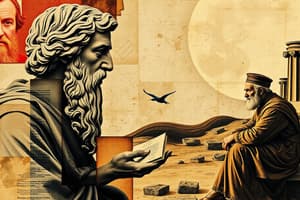Podcast
Questions and Answers
What does the term 'philosophy' mean?
What does the term 'philosophy' mean?
Love of wisdom
Who is credited with the invention of philosophy?
Who is credited with the invention of philosophy?
- Socrates
- Plato
- Aristotle
- Pythagoras (correct)
Ethics is the study of rightness and wrongness of an ________.
Ethics is the study of rightness and wrongness of an ________.
action
Which of the following groups did Pythagoras identify as the 'lovers of gain'?
Which of the following groups did Pythagoras identify as the 'lovers of gain'?
What does 'epoche' refer to in the Husserlian phenomenological method?
What does 'epoche' refer to in the Husserlian phenomenological method?
Metaphysics studies only physical beings.
Metaphysics studies only physical beings.
What are the two types of beings mentioned?
What are the two types of beings mentioned?
Flashcards are hidden until you start studying
Study Notes
Introduction to Philosophy
- Philosophy translates to "Love of Wisdom," originating from the Greek words "Philein" (love) and "Sophia" (wisdom).
- Pythagoras is credited with coining the term "philosopher" to describe lovers of wisdom.
Doing Philosophy
- A conditional statement illustrates logical reasoning: "If it rains today, then the road is wet." Confirmation follows with "It rains today. Therefore, the road is wet."
- An example of reasoning: "The professor will be absent only if he/she is sick." This leads to "The professor is sick, therefore he/she will be absent."
Historical Meaning of Philosophy
- Pythagoras observed three types of spectators at the Olympic Games who embody different motivations:
- Lovers of Gain: Attendees focused on profit and selling goods.
- Lovers of Fame: Competitors, including athletes and politicians, seeking honor and recognition.
- Lovers of Spectacle: Observers enjoying the events for entertainment.
Value of Philosophy
- Encourages self-examination and reflection on one's life experiences.
- Promotes critical thinking, challenging personal views and beliefs to pursue truth.
Marcelian’s Philosophical Reflection
- Primary Reflection: Dissects an object into its components, analyzing its meaning and function.
- Secondary Reflection: Synthesizes various components into a unified understanding, adding personal significance.
Being/Beings
- Refers to all entities that exist, categorized into two types:
- Material Beings: Tangible, physical objects.
- Immaterial Beings: Non-physical entities.
Major Branches of Philosophy
- Metaphysics: Studies concepts beyond physical experience, such as existence and reality.
- Central metaphysical questions include the existence of God, control over destiny, and the nature of the soul.
The Husserlian Phenomenological Method
- Epoche: The practice of setting aside biases about an object to experience it more fully.
- Key questions to identify natural attitudes towards an experience include:
- What preconceptions exist towards an object or experience?
- Key questions to identify natural attitudes towards an experience include:
Studying That Suits You
Use AI to generate personalized quizzes and flashcards to suit your learning preferences.




